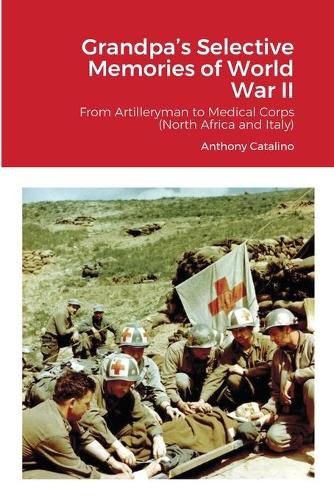Readings Newsletter
Become a Readings Member to make your shopping experience even easier.
Sign in or sign up for free!
You’re not far away from qualifying for FREE standard shipping within Australia
You’ve qualified for FREE standard shipping within Australia
The cart is loading…






This title is printed to order. This book may have been self-published. If so, we cannot guarantee the quality of the content. In the main most books will have gone through the editing process however some may not. We therefore suggest that you be aware of this before ordering this book. If in doubt check either the author or publisher’s details as we are unable to accept any returns unless they are faulty. Please contact us if you have any questions.
This is a war memoir focused on people, not fighting. One day Anthony Catalino's 11-year-old granddaughter asked him if he had ever been in the war. After briefly confirming to her that he indeed had, he realized that a brief answer didn't really say much of anything. He decided that there were stories about his four-and-a-half years in World War II that needed to be told. Not combat stories, for he never saw direct combat, but instead, all of the oblique, behind-the-scenes events which still made the war a momentous, life-changing journey. Catalino, a retired social service worker and administrator, has a sure touch for shaping his anecdotes to reveal the important truths contained in them. For instance, when he describes the training of his artillery battery, he tells stories, with no rough language censored, about how confrontational things could get in a group of soldiers from the deep south, New York City, and upstate New York, such as Rochester, from where Catalino himself came. Catalino's military career took an abrupt turn out of the artillery sphere, though, with an impromptu football game. The game was played the second day of bivouac in the Algerian port of Oran in northern Africa. A sharp turn made to evade a tackle led to his foot sliding across the loose stones, twisting his right knee and tearing the ligaments. This led to him being placed on limited service for the rest of the war. Ending up a medical technician he witnessed the endless streams of wounded, mangled soldiers coming into the provisional hospital in Florence, where Catalino was stationed for a long stretch before moving farther west and north as the war went into its closing phases. 36 photos. A Merriam Press World War II Memoir.
$9.00 standard shipping within Australia
FREE standard shipping within Australia for orders over $100.00
Express & International shipping calculated at checkout
This title is printed to order. This book may have been self-published. If so, we cannot guarantee the quality of the content. In the main most books will have gone through the editing process however some may not. We therefore suggest that you be aware of this before ordering this book. If in doubt check either the author or publisher’s details as we are unable to accept any returns unless they are faulty. Please contact us if you have any questions.
This is a war memoir focused on people, not fighting. One day Anthony Catalino's 11-year-old granddaughter asked him if he had ever been in the war. After briefly confirming to her that he indeed had, he realized that a brief answer didn't really say much of anything. He decided that there were stories about his four-and-a-half years in World War II that needed to be told. Not combat stories, for he never saw direct combat, but instead, all of the oblique, behind-the-scenes events which still made the war a momentous, life-changing journey. Catalino, a retired social service worker and administrator, has a sure touch for shaping his anecdotes to reveal the important truths contained in them. For instance, when he describes the training of his artillery battery, he tells stories, with no rough language censored, about how confrontational things could get in a group of soldiers from the deep south, New York City, and upstate New York, such as Rochester, from where Catalino himself came. Catalino's military career took an abrupt turn out of the artillery sphere, though, with an impromptu football game. The game was played the second day of bivouac in the Algerian port of Oran in northern Africa. A sharp turn made to evade a tackle led to his foot sliding across the loose stones, twisting his right knee and tearing the ligaments. This led to him being placed on limited service for the rest of the war. Ending up a medical technician he witnessed the endless streams of wounded, mangled soldiers coming into the provisional hospital in Florence, where Catalino was stationed for a long stretch before moving farther west and north as the war went into its closing phases. 36 photos. A Merriam Press World War II Memoir.